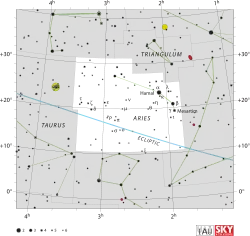
| |
| Observation data Epoch J2000 Equinox J2000 | |
|---|---|
| Constellation | Aries |
| Right ascension | 02h 43m 27.11185s[1] |
| Declination | +27° 42′ 25.7233″[1] |
| Apparent magnitude (V) | 4.64[2] |
| Characteristics | |
| Spectral type | B3 V[3] |
| U−B color index | –0.62[4] |
| B−V color index | –0.14[4] |
| Astrometry | |
| Radial velocity (Rv) | +13[5] km/s |
| Proper motion (μ) | RA: 2.06[1] mas/yr Dec.: –10.37[1] mas/yr |
| Parallax (π) | 9.51 ± 0.85 mas[1] |
| Distance | 340 ± 30 ly (105 ± 9 pc) |
| Details | |
| Mass | 5.7 ± 0.3[6] M☉ |
| Radius | 2.2–3.9[7] R☉ |
| Luminosity | 870[8] L☉ |
| Temperature | 17,520[9] K |
| Rotational velocity (v sin i) | 90[10] km/s |
| Age | 5.5 ± 4.7[6] Myr |
| Other designations | |
| Database references | |
| SIMBAD | data |
35 Arietis (abbreviated 35 Ari) is a binary star[11] in the northern constellation of Aries. 35 Arietis is the Flamsteed designation. It is approximately 340 light-years (100 parsecs) distant from the Earth, based upon an annual parallax shift of 9.51 mas.[1] This star is visible to the naked eye with an apparent visual magnitude of 4.64.[2]
This is a single-lined spectroscopic binary system, with the presence of a companion being demonstrated by shifts in the spectrum of the primary component.[12] The pair orbit each other with a period of 490.0 days and an eccentricity of 0.14.[11] The primary is a B-type main-sequence star with a stellar classification of B3 V.[3] With a mass around 5.7 times that of the Sun, it is radiating 870[8] times the Sun's luminosity. This energy is being emitted from the outer atmosphere at an effective temperature of 17,520 K,[9] causing it to shine with the blue-white hue of a B-type star.[13]
This star was formerly located in the obsolete constellation Musca Borealis.
References
- 1 2 3 4 5 6 van Leeuwen, Floor (November 2007), "Validation of the new Hipparcos reduction", Astronomy and Astrophysics, 474 (2): 653–664, arXiv:0708.1752v1, Bibcode:2007A&A...474..653V, doi:10.1051/0004-6361:20078357, S2CID 18759600. Note: see VizieR catalogue I/311.
- 1 2 3 "35 Ari -- Star", SIMBAD, Centre de Données astronomiques de Strasbourg, retrieved 2012-08-15.
- 1 2 Borgman, J. (December 1960), "Seven-Colour Photometry of O, B and A Stars", Bulletin of the Astronomical Institutes of the Netherlands, 15: 255, Bibcode:1960BAN....15..255B.
- 1 2 Crawford, D. L.; Barnes, J. V.; Golson, J. C. (1971), "Four-color, Hbeta, and UBV photometry for bright B-type stars in the northern hemisphere", The Astronomical Journal, 76: 1058, Bibcode:1971AJ.....76.1058C, doi:10.1086/111220.
- ↑ Evans, D. S. (June 20–24, 1966). "The Revision of the General Catalogue of Radial Velocities". In Batten, Alan Henry; Heard, John Frederick (eds.). Determination of Radial Velocities and their Applications, Proceedings from IAU Symposium no. 30. University of Toronto: International Astronomical Union (published 1967). pp. 57–63. Bibcode:1967IAUS...30...57E.
- 1 2 Tetzlaff, N.; Neuhäuser, R.; Hohle, M. M. (January 2011), "A catalogue of young runaway Hipparcos stars within 3 kpc from the Sun", Monthly Notices of the Royal Astronomical Society, 410 (1): 190–200, arXiv:1007.4883, Bibcode:2011MNRAS.410..190T, doi:10.1111/j.1365-2966.2010.17434.x, S2CID 118629873.
- ↑ Pasinetti Fracassini, L. E.; et al. (February 2001), "Catalogue of Apparent Diameters and Absolute Radii of Stars (CADARS) - Third edition - Comments and statistics", Astronomy and Astrophysics, 367 (2): 521–524, arXiv:astro-ph/0012289, Bibcode:2001A&A...367..521P, doi:10.1051/0004-6361:20000451, S2CID 425754.
- 1 2 Hohle, M. M.; Neuhäuser, R.; Schutz, B. F. (April 2010), "Masses and luminosities of O- and B-type stars and red supergiants", Astronomische Nachrichten, 331 (4): 349, arXiv:1003.2335, Bibcode:2010AN....331..349H, doi:10.1002/asna.200911355, S2CID 111387483.
- 1 2 Zorec, J.; et al. (July 2009), "Fundamental parameters of B supergiants from the BCD system. I. Calibration of the (λ_1, D) parameters into Teff", Astronomy and Astrophysics, 501 (1): 297–320, arXiv:0903.5134, Bibcode:2009A&A...501..297Z, doi:10.1051/0004-6361/200811147, S2CID 14969137.
- ↑ Abt, Helmut A.; Levato, Hugo; Grosso, Monica (July 2002), "Rotational Velocities of B Stars", The Astrophysical Journal, 573 (1): 359–365, Bibcode:2002ApJ...573..359A, doi:10.1086/340590.
- 1 2 Eggleton, P. P.; Tokovinin, A. A. (September 2008), "A catalogue of multiplicity among bright stellar systems", Monthly Notices of the Royal Astronomical Society, 389 (2): 869–879, arXiv:0806.2878, Bibcode:2008MNRAS.389..869E, doi:10.1111/j.1365-2966.2008.13596.x, S2CID 14878976.
- ↑ van Rensbergen, W.; De Loore, C.; Jansen, K. (February 2006), "Evolution of interacting binaries with a B type primary at birth", Astronomy and Astrophysics, 446 (3): 1071–1079, Bibcode:2006A&A...446.1071V, doi:10.1051/0004-6361:20053543.
- ↑ "The Colour of Stars", Australia Telescope, Outreach and Education, Commonwealth Scientific and Industrial Research Organisation, December 21, 2004, archived from the original on March 18, 2012, retrieved 2012-01-16.